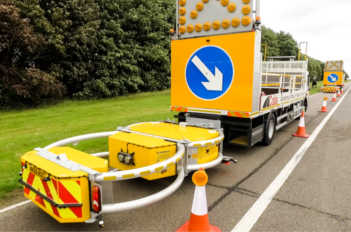A partnership between Colas and two US companies is seeking to save roadworker lives with what is thought to be the world’s first Autonomous Impact Protection Vehicle (AIPV).
This August, Colas took a step forward on the path to making the road a safer place to work when an AIPV was used live onsite in Colorado.
The idea behind it is to increase worker safety by removing the need for a driver in what is effectively a mobile crash barrier, protecting workers and equipment from errant vehicles on busy roads.

The Autonomous Impact Protection Vehicle on the road
Lee Rushbrooke, CEO of Colas, said: ‘We are dedicated to advancing health and safety issues and will continue to invest in cutting-edge research and development projects to benefit our employees, clients and the wider industry. We are extremely excited about this new technology and are looking forward to giving this a global reach to save lives of road workers, across the world.’
RT&E president Robb Roy said: ‘Colas’ innovative approach to health and safety is precisely why we are delighted to be working with them on this cutting-edge project in Europe. There is no doubt that this technology has the potential to change the way the industry operates forever.’
Colas’s two partners in the project are Royal Truck and Equipment (RT&E), a leading manufacturer of truck mounted attenuator and safety trucks in the US, and Micro Systems Inc (MSI) a subsidiary of Kratos Defense & Security Solutions.
Having initially been developed for the US military, the technology used by the vehicle has been tailored by RT&E and MSI for use in the highways industry.
The unmanned AIPV is fitted with an electro-mechanical applique kit and fully integrated sensor suite and utilises a leader/follower capability that enables it to follow a driver-operated leader vehicle.
Navigation data including vehicle speed and heading is transmitted from the leader vehicle to the follower vehicle. This enables the follower vehicle to follow the exact path and speed of the leader vehicle at each point along the route.
Highways England has a number of targets under its five-year health and safety plan, including a cut in the accident frequency rate (AFR) – injury rate per 100,000 hours worked - for its supply chain. The baseline is measured from 2014/15, when the AFR was 0.15. The target is to cut this 0.05 by 2020. The most recent measurement from 2016/17 is 0.11.
In an update to the plan in May, the Government-owned company said it needed to increase the speed at which the AFR is improving to meet its aspirations.
Mike Wilson, Highways England’s executive director for safety, engineering and standards said: ‘We welcome this innovative work by Colas, which through the use of connected and autonomous vehicle technology, has the potential to help the sector address the risks road workers face on a daily basis.
‘Our number one imperative is safety and we believe no one should be harmed when travelling or working on our road network.’
Colas said its engineers and colleagues from RT&E and MSI have worked constantly together to develop, monitor and trial the system to ensure the highest possible performance. Over 200 hours of rigorous and successful testing and training were completed prior to the vehicle being declared ready for use on live worksites in the US.
Currently UK legislation does not allow an unmanned autonomous vehicle to be on the roads. Colorado have made that policy change already, which allowed these trials to take place.
Register now for full access
Register just once to get unrestricted, real-time coverage of the issues and challenges facing UK transport and highways engineers.
Full website content includes the latest news, exclusive commentary from leading industry figures and detailed topical analysis of the highways, transportation, environment and place-shaping sectors.
Use the link below to register your details for full, free access.
Already a registered? Login